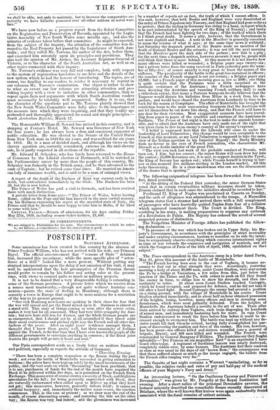- The Times correspondent in the Austrian camp in a
letter dated Pavia, May 21, gives this account of the battle of Montebello.
"The French having been seen to the east of Voghera, it became ne- cessary to find out in what strength they were. Accordingly, yesterday • morning a body of about 20,000 men, under Count Stadion, were sent across the Po by a bridge at Vac,carizza, a few miles from this, just below the junction of the Ticino and the Po, with orders to push on till they found the enemy in force to oblige him to show his strength, and then im- mediately to retire. At about noon Count Stadion reached Caste 'o, which he found occupied, and prepared for defence, and he did not take it till after a hard fight. Beyond Casteggio the enemy had secured a positioa on a rising ground, with the village of Montebello in his centre. Count Stadion attacked immediately, and in about half an hour obtained possession of the heights, losing, however, many officers and men in storming some farmhouses, which were most gallantly defended. From the heights of Montebello the Austrians beheld a novelty in the art of war. Train after train arrived by railway from Voghera, each train disgorging its hundreds of armed men, and immediately hastening back for more. In vain Count Stadion endeavoured to crush the force before him before it could be in- creased enough to overpower him. The battle was kept up without any de- cisive result till dark when he retired, having fully amomplished his pur- pose of discovering the position and force of the enemy. His loss, however, has been great—ten officers killed and sixteen wounded (one a general of brigade, 33raun), and 400 men killed and wounded. The French were commanded by General Baragurty d' Hilliers. The Austrians say they fought splendidly—' Der Franzos ist em magnifiker Karl" is an expression I have heard often today. A regiment of Sardinian lancers was nearly destroyed, completely ridden over by some husaars. The Austrians had their reserves as close as was usual in the days of old brown Bess ; ' the consequence was that these suffered almost as much as the troops engaged, the bullets from the French rifles ranging very far."
The Gazette of last night contains a Warrant "assimilating, as far as possible, the relative ranks and rates of pay and half-pay of the medical officers of your Majesty's Navy and Army."


























 Previous page
Previous page